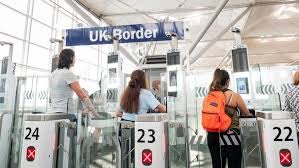Changing rules of travel to Europe

RECENTLY, there have been significant shifts in European Union (EU) immigration policies that change the rules of travel to most European countries.
Effective November 10, a new digital system called the Entry/Exit System (EES) will come into effect, transforming the way non-EU travellers enter and exit the Schengen Area. This high-tech upgrade aims to enhance security and streamline border-crossing procedures. The EES is a digital leap for EU borders that makes a significant shift from archaic passport-stamping to a more modern, computerised and biometric approach.
The new system applies to non-EU citizens entering the Schengen Area for short stays and includes tourists, business travellers and others who do not need a visa to visit Europe.
When travellers from outside the EU arrive at a Schengen border, they will scan their passports at self-service kiosks. These machines will retrieve important information like names, travel document details, fingerprints and facial images from the passport.
EU's Home Affairs Commissioner Ylva Johansson announced the launch date during a visit to eu-LISA, the EU Agency for the operational management of large-scale IT systems in the areas of freedom, security and justice.
The agency was established to provide a long-term solution for the operational management of large-scale IT systems, which are essential instruments in implementing EU asylum, border management and migration policies.
Johansson emphasised the EES’ role in improving border security, saying, "With the EES we will know exactly who enters the Schengen area with a foreign passport. We will know if people stay too long, countering irregular migration."
The next major change takes effect in May 2025, when visitors from over 60 visa-exempt countries will be required to have the European Travel Information and Authorisation System (ETIAS) travel authorisation to enter 30 European countries for short stays.
ETIAS is very similar to the American Electronic System for Travel Authorisation (ETAS) and does background checks to identify potential security risks posed by applicants seeking to enter Europe’s external borders. Using criminal records and security databases from criminal-justice institutions such as Europol and Interpol, the ETIAS creates a security network to keep European citizens and visitors safe.
Once ETIAS kicks in, citizens of the US, Canada, the UK and many other countries, including TT, who previously enjoyed visa-free travel with only a passport to most EU countries, will now require an ETIAS travel authorisation to enter any of 30 participating EU countries. ETIAS will work together with the EES, adding another layer to the EU’s border-management strategy.
The ETIAS travel authorisation will be required by visitors who plan to stay in a participating country for 90 days or less and will be valid for three consecutive years or until the passport expires, whichever comes first.
The ETIAS travel authorisation is linked to a traveller’s passport, so if you get a new passport, you will need to get a new ETIAS travel authorisation.
The cost of the ETIAS travel authorisation is €7 (TT$52.46). However, the fee will be waived for travellers under 18 years old or over 70.
According to the European Commission, the new requirements will assist border authorities to "identify security, irregular migration and high epidemic risks posed by visa-exempt visitors." Under ETIAS, travellers will undergo security screenings before they arrive in the participating EU country, preventing those who pose a security threat from entering.

ETIAS was approved in 2016 as part of an international effort to increase security. It was originally scheduled to begin in 2021, but a series of setbacks, including the covid19 pandemic and a lack of infrastructure to support the programme, delayed its start multiple times.
Having a valid ETIAS travel authorisation does not guarantee an automatic right of entry.
When visitors arrive, border agents will verify that they meet the entry requirements. Visitors who do not meet the entry requirements will be refused entry.
According to the ETIAS website, TT will be a launch member and citizens will be eligible to apply online for travel authorisation in 2025.
The website also saystravellers must have a machine-readable e-passport. The present TT passport, though machine-readable, is not an e-passport. Therefore it may not contain all the biometric data of the applicant required to process the ETIAS application.
The implications of this are unclear, and hopefully, TT citizens who do not have an e-passport will not be required to obtain Schengen visas to enter Schengen countries.
The introduction of the EES and ETIAS will enable authorities to track easily how people enter and exit the EU. It will make it very easy for authorities to track illegal immigration and those who have overstayed their welcome. This will lead to stricter enforcement of immigration rules and affect future entry authorisations for those who did not comply with their authorised stay duration.
EES and ETIAS integrate into broader Schengen visa policies by enhancing the EU’s ability to effectively monitor the movements of non-EU citizens within the Schengen Area, thereby creating a more secure and efficient border-management system.
Digitised border-control data will enable the EU to efficiently manage migration flows and improve security with very targeted and accurate real-time data on who enters and leaves the Schengen Area.
The implementation of EES and ETIAS showcases the EU’s commitment to using technology to address complex immigration challenges.
As these tools evolve, they pave the way for more technologically advanced border management procedures in the future.
Short-term visitors to the EU will need to be familiar with the new procedures at EU borders to plan ahead for ETIAS approval. Travellers will need to apply in advance of their planned travel to the EU, giving enough time to resolve any problems that may arise, such as needing to appeal a refusal.
Since e-passports significantly enhance border control measures, other countries may soon mandate deadlines for all visitors to have e-passports. Therefore, affected countries should proactively give top priority to issuing e-passports to their citizens.
TT, as a signatory to the Chicago Convention, has a serious international treaty obligation to comply with the Standards of ICAO Annex 9 – Facilitation.

Comments
"Changing rules of travel to Europe"